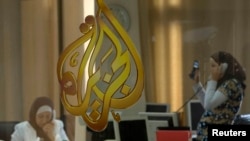Four Arab countries are demanding Qatar take its government-supported Al Jazeera news channel off the air in the latest development in a dispute stemming from allegations Qatar is funding terrorist organizations.
The demand is on a 13-point list issued by the United Arab Emirates, Egypt, Saudi Arabia and Bahrain — the four Arab states that cut diplomatic and economic ties with Qatar three weeks ago. The four countries say Qatar has 10 days to comply but do not say what will happen if the demands are refused.
In reaction to the demand, Al Jazeera issued a statement that said, in part, "We in the Network believe that any call for closing down Al Jazeera is nothing but an attempt to silence the freedom of expression in the region and to suppress people's right to information and the right to be heard. We assert our right to practice our journalism professionally without bowing to pressure from any government or authority and we demand that governments respect the freedom of media to allow journalists to continue to do their jobs free of intimidation, threats and fearmongering."
On June 8, Al Jazeera said it was experiencing "systematic and continual" hacks to its website. That claim could not be confirmed by outside media groups.
In May, Egypt blocked 21 news outlets, including Al Jazeera, for what it called sympathy toward the Muslim Brotherhood, a political organization banned in the country.
Regional allies Saudi Arabia and Jordan followed suit in June, shutting down Al Jazeera's news bureaus in Riyadh and Amman. The Saudi government also ordered hotels and other businesses catering to tourists to block Al Jazeera programming or face stiff fines.
Qatar's influence
The popular satellite broadcaster gives the tiny Gulf state a powerful influence in the region. In the past, Doha-based Al Jazeera has been critical of Saudi Arabia and Egypt's military government.
Although it avoids critical coverage of Qatar and the royal family, Al Jazeera reports on various ideological groups and was a major source of news as the Arab Spring that began in late 2010 toppled dictatorships throughout the Arab world.
Critics accuse the outlet of supporting Iran and Sunni terrorism.
The Muslim Brotherhood temporarily held power in Egypt after former President Mohamed Morsi won the nation's first open democratic election. The current president, Abdel Fattah el-Sisi, led a military coup against Morsi's government in 2013 and barred the Muslim Brotherhood from politics when he took power.





